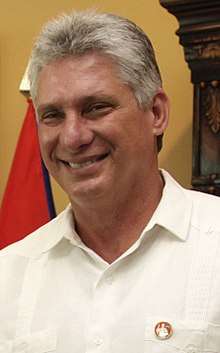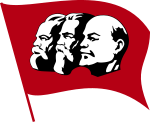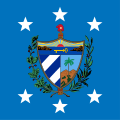Miguel Díaz-Canel
| Miguel Díaz-Canel | |
|---|---|
 | |
| 17th President of Cuba | |
|
Assumed office 19 April 2018 | |
| Vice President | Salvador Valdés Mesa |
| Leader | Raúl Castro (First Secretary of the Communist Party) |
| Preceded by | Raúl Castro |
| 3rd First Vice President of Cuba | |
|
In office 24 February 2013 – 19 April 2018 | |
| President | Raúl Castro |
| Preceded by | José Ramón Machado |
| Succeeded by | Salvador Valdés Mesa |
| Minister of Higher Education | |
|
In office 8 May 2009 – 21 March 2012 | |
| President | Raúl Castro |
| Preceded by | Juan Vela Valdés |
| Succeeded by | Rodolfo Alarcón Ortiz |
| Personal details | |
| Born |
Miguel Mario Díaz-Canel Bermúdez 20 April 1960 Placetas, Villa Clara, Cuba |
| Political party | Communist Party |
| Spouse(s) |
Martha (Divorced) Lis Cuesta |
| Children | 2 |
| Alma mater | Marta Abreu University of Las Villas |
Miguel Mario Díaz-Canel Bermúdez (American Spanish: [miˈɣel ˈdi.as kaˈnel]; born 20 April 1960) is a Cuban politician serving as the current President of Cuba. He was previously First Vice President from 2013 to 2018. He has been a member of the Politburo of the Communist Party of Cuba since 2003, and he served as Minister of Higher Education from 2009 to 2012; he was promoted to the post of Vice President of the Council of Ministers (deputy Prime Minister) in 2012. A year later, on 24 February 2013, he was elected as First Vice President of the Council of State.[1]
He was selected to succeed Raúl Castro as the candidate for President of the Council of State and the Council of Ministers on 18 April 2018, and sworn into office the following day after nationwide polling.
His two predecessors in the role were brothers, by blood, and notably his sucession from Raúl Castro represents a clearly non-dynastic form of succession for the Communist Party as well as the Republic of Cuba.
Díaz-Canel is therefor the first president to not be a Castro family member since Osvaldo Dorticós only two premierships beforehand, and the third overall post-revolution, including Dorticós himself and also Manuel Urrutia Lleó. Miguel Díaz-Canel is likely to succeed Raúl Castro as First Secretary of the Communist Party of Cuba, the most important position in Cuba, in 2021.[2]
Early life and education
Díaz-Canel was born on 20 April 1960 in Placetas, Villa Clara, to Aída Bermúdez, a schoolteacher, and Miguel Díaz-Canel, a mechanical plant worker in Santa Clara.[3][4] Of direct paternal Spanish (Asturian) descent; his great-grandfather Ramón Díaz-Canel left Castropol, Asturias for Havana in the late 19th century.[5][6]
He graduated from Central University of Las Villas in 1982 as an electronics engineer and thereupon joined the Cuban Revolutionary Armed Forces.[7] Beginning in April 1985, he taught at his alma mater. In 1987, he completed an international mission in Nicaragua as First Secretary of the Young Communist League of Villa Clara.
Political career
In 1993, Díaz-Canel started work with the Communist Party of Cuba and a year later was elected First Secretary of the Provincial Party Committee of Villa Clara Province (a position equivalent to a regional governor).[7][8] He gained a reputation for competence in this post,[8] during which time he also championed LGBT rights at a time when many in the province frowned upon homosexuality.[9] In 2003, he was elected to the same position in Holguín Province.[7][10] In the same year, he was co-opted as a member of the Politburo of the Communist Party of Cuba.[11]
Díaz-Canel was appointed Minister of Higher Education in May 2009, a position that he held until 22 March 2012, when he became Vice President of the Council of Ministers (deputy prime minister).[7][12] In 2013 he additionally became First Vice President of Cuba.[7]
President of Cuba
As First Vice President of the Council of State, Díaz-Canel acted as deputy to the President, Raúl Castro. In 2018, the 86-year-old Castro stepped down from the presidency, though he retained the powerful position of First Secretary of the Communist Party of Cuba and the commander-in-chief of the Cuban Revolutionary Armed Forces.[13][14] On 18 April 2018, Díaz-Canel was selected as the only candidate to succeed Castro as president.[8] He was confirmed by a vote of the National Assembly on 19 April[8] and sworn in on the same day.[15]
He is a party technocrat who was little-known to the public before becoming president. Policy experts expected him to pursue cautious reform of his predecessors' economic policies, while preserving the country's social structure.[9] Journalist Andrés Oppenheimer has argued that, with the power that Castro has kept, the president of Cuba would be a mere ceremonial figure, unable to make any actual changes.[14] He is the first president born after the 1959 Cuban Revolution and the first since 1976 not to be a member of the Castro family.[9]
Personal life
Díaz-Canel has two children with his first wife Martha, and he currently resides with his second wife Lis Cuesta.[16]
See also
References
- ↑ "Ratificado Raúl como presidente del Consejo de Estado y del Consejo de Ministros (+ Fotos)". Cubadebate.
- ↑ "Miguel Diaz-Canel named Cuba's new president". CNN. 20 April 2018.
Still, Castro made clear Díaz-Canel will ultimately succeed him as head of the Communist Party when he steps down form that post in 2021.
- ↑ "Díaz-Canel no es un relevo histórico". Martinoticias. 25 February 2013. Retrieved 10 January 2016.
- ↑ Ahmed, Azam; Robles, Frances (19 April 2018). "Who Is Miguel Díaz-Canel, Cuba's New President?". The New York Times. Retrieved 20 April 2018.
- ↑ Cuba ya tiene un nuevo presidente, de ascendencia asturiana - ileon
- ↑ De ruta por las raíces asturianas de Miguel Díaz-Canel - El Comercio
- 1 2 3 4 5 Damien Cave, Raúl Castro Says His Current Term as President of Cuba Will Be His Last, The New York Times, 24 February 2013
- 1 2 3 4 Press, Associated (19 April 2018). "Miguel Díaz-Canel: Cuba selects first non-Castro president since Fidel". The Guardian. Retrieved 19 April 2018.
- 1 2 3 Augustin, Ed (18 April 2018). "After six decades of Castro rule, Cubans greet end of era with a shrug". The Guardian. Retrieved 19 April 2018.
- ↑ "En sustitución de Juan Vela es designado Miguel Díaz Canel ministro de Educación Superior". cubaheadlines.com.
- ↑ Ryan Villarreal (26 February 2013). "Sustaining The System: Cuba's New VP Diaz-Canel Marks Ascent Of Younger Generation". International Business Times.
- ↑ "Nota oficial". www.granma.cubasi.cu.
- ↑ "Raul Castro to lead Cuba's Communist Party until 2021". FRANCE 24. 19 April 2018.
'I confirm to this assembly that Raul Castro, as first secretary of the Communist Party, will lead the decisions about the future of the country,' Diaz-Canel said.
- 1 2 Andrés Oppenheimer (April 20, 2018). "Cuba's new 'babysaur' to replace a dinosaur is no cause of celebration—it's shameful!". Miami Herald. Retrieved 23 April 2018.
- ↑ "Cuba's Raúl Castro hands over power to Miguel Díaz-Canel". BBC News. 19 April 2018. Retrieved 2018-04-19.
- ↑ "Quién es Miguel Díaz-Canel, el sucesor de Fidel y Raúl Castro". 25 February 2013. Retrieved 12 June 2015.
External links
| Wikimedia Commons has media related to Miguel Díaz-Canel. |
| Political offices | ||
|---|---|---|
| Preceded by Raúl Castro |
President of Cuba 2018–present |
Incumbent |
| Prime Minister of Cuba 2018–present | ||
| Preceded by José Ramón Machado Ventura |
First Vice President of Cuba 2013–2018 |
Succeeded by Salvador Valdés Mesa |


